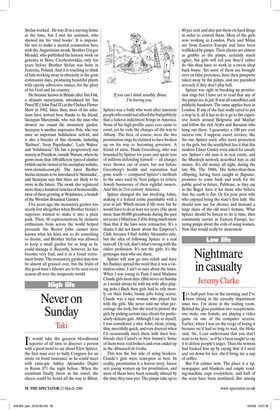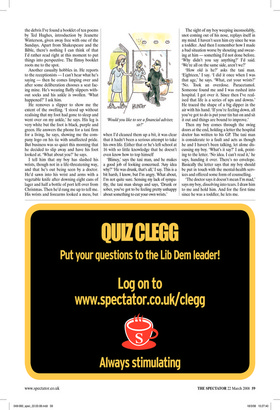Nightmare in casualty
Jeremy Clarke
It’s half-past four in the morning and I’ve been sitting in the casualty department since two. I’m alone in the waiting room. Behind the glass partition two receptionists, one male, one female, are playing a video game on one of the computer screens. Earlier, when I was on the verge of losing it because we’d had so long to wait, the bloke said, ‘Sir, I can understand that you don’t want to be here,’ as if he’s been taught to say it to defuse people’s anger. Then the woman had backed him up by saying that if I went and sat down for her, she’d bring me a cup of coffee.
But I’m calmer now. The place is a tip, newspaper and blankets and empty vending-machine cups everywhere, and half of the seats have been mutilated. But among the debris I’ve found a booklet of ten poems by Ted Hughes, introduction by Jeanette Winterson, given away free with one of the Sundays. Apart from Shakespeare and the Bible, there’s nothing I can think of that I’d rather read right at this moment to put things into perspective. The flimsy booklet roots me to the spot.
Another casualty hobbles in. He reports to the receptionists — I can’t hear what he’s saying — then he comes limping over and after some deliberation chooses a seat facing mine. He’s wearing fluffy slippers without socks and his ankle is swollen. ‘What happened?’ I ask him.
He removes a slipper to show me the extent of the swelling. ‘I stood up without realising that my foot had gone to sleep and went over on my ankle,’ he says. His leg is very white but the foot is black, purple and green. He answers the phone for a taxi firm for a living, he says, showing me the company logo on his tie with unaffected pride. But business was so quiet this morning that he decided to slip away and have his foot looked at. ‘What about you?’ he says.
I tell him that my boy has slashed his wrists, though not in a life-threatening way, and that he’s out being seen by a doctor. He’d sawn into his wrist and arms with a vegetable knife after downing eight cans of lager and half a bottle of port left over from Christmas. Then he’d rung me up to tell me. His wrists and forearms looked a mess, but when I’d cleaned them up a bit, it was clear that it hadn’t been a serious attempt to take his own life. Either that or he’s left school at 16 with so little knowledge that he doesn’t even know how to top himself ‘Blimey,’ says the taxi man, and he makes a good job of looking concerned. ‘Any idea why?’ ‘He was drunk, that’s all,’ I say. This is a bit harsh, I know, but I’m angry. What about, I’m not quite sure. Sensing my lack of sympathy, the taxi man shrugs and says, ‘Drunk or sober, you’ve got to be feeling pretty unhappy about something to cut your own wrists.’ The sight of my boy weeping inconsolably, snot coming out of his nose, replays itself in my mind. I haven’t seen him cry since he was a toddler. And then I remember how I made a bad situation worse by shouting and swearing at him — something I’d not done before. ‘Why didn’t you say anything?’ I’d said. ‘We’re all on the same side, aren’t we?’ ‘How old is he?’ asks the taxi man. ‘Eighteen,’ I say. ‘I did it once when I was that age,’ he says. ‘What, cut your wrists?’ ‘No. Took an overdose. Paracetamol. Someone found me and I was rushed into hospital. I got over it. Since then I’ve realised that life is a series of ups and downs.’ He traced the shape of a big dipper in the air with his hand. ‘If you’re feeling down, all you’ve got to do is put your tin hat on and sit it out and things are bound to improve.’ Then my boy comes through the swing doors at the end, holding a letter the hospital doctor has written to his GP. The taxi man is considerate to a fault and acts as though he and I haven’t been talking, let alone discussing my boy. ‘What’s it say?’ I ask, pointing to the letter. ‘No idea. I can’t read it,’ he says, handing it over. There’s no envelope. Basically the letter says that my boy should be put in touch with the mental-health services and offered some form of counselling.
‘The doctor says it doesn’t mean I’m mad,’ says my boy, dissolving into tears. I draw him to me and hold him. And for the first time since he was a toddler, he lets me.



















































































 Previous page
Previous page